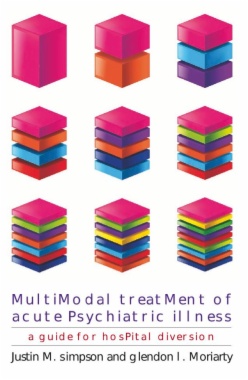The multimodal treatment of acute psychiatric illness involves a set of integrated, systematic interventions that stabilize individuals with severe mental illness and help them avoid unnecessary psychiatric hospitalization. This volume focuses on those suffering from schizophrenia, schizoaffective disorder, bipolar disorder, major depressive disorder, severe anxiety, and substance dependence, and provides individual practitioners and professional teams with the tools for responding to crisis and delivering acute care. The authors bolster the text with real-world case examples, helpful diagrams, and printable worksheets.
- Contents
- Preface
- 1. Hospital Diversion Programs
- Why Do Hospital Diversion Programs Exist?
- Types of Hospital Diversion Programs
- Do Hospital Diversion Programs Work?
- 2. Integrative and Multimodal Treatment
- Integrative Treatment
- Multimodal Therapy
- 3. Severe Mental Illness Treatment Literature
- Schizophrenia and Schizoaffective Disorder
- Bipolar and Major Depressive Order
- PTSD and Panic Disorder
- Substance-Related Disorders
- 4. Multimodel Acute Care
- A Review of Crisis and Brief Intervention Models
- A Proposed Acute Care Approach
- Theoretical Basis of the Approach
- A Recovery-Oriented Approach
- Components of Multimodal Acute Care
- 5. Fundamental Tools and Techniques
- Suicide/Self-Harm Assessment
- Drug Screen
- Crisis Action Plan
- Contracts
- Improve Coping Skills
- Activity Scheduling
- Assertiveness Traning
- Medication Adherence
- General Tips for Addressing Social and Environmental Issues
- 6. Schizophrenia and Schizoaffective Disorder
- Perform Assessment
- Establish Equilibrium
- Address Social and Environmental Issues
- Relapse Prevention
- 7. Major Depression and Bipolar Disorder
- Perform Assessment
- Establish Equilibrium
- Address Social and Environmental Issues
- Relapse Prevention
- 8. PTSD and Panic Disorder
- Perform Assessment
- Establish Equilibrium
- Address Social and Environmental Issues
- Relapse Prevention
- 9. Substance-Related Disorders
- Perform Assessment
- Establish Equilibrium
- Address Social and Environmental Issues
- Relapse Prevention
- 10. Important Treatment Considerations
- Unique Challenges Associated with the Borderline Personality
- Cultural Perspectives on Mental Health Treatment
- Religion and Spirituality as a Coping Resource
- Conclusion
- Appendix A: Crisis Action Plan
- Appendix B: Thought Change Worksheet
- Appendix C: Stress-Vulnerability Model Diagrams
- References
- Index

